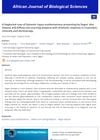 June 2024 in “Indian Dermatology Online Journal”
June 2024 in “Indian Dermatology Online Journal” Topical tofacitinib is effective and safe for treating alopecia areata.
 February 2024 in “The Open dermatology journal”
February 2024 in “The Open dermatology journal” Alopecia Areata affects people of all ages worldwide, is likely caused by genetic and environmental factors, and can lead to stress and depression, highlighting the need for treatments that address both physical and mental health.
 May 2023 in “Journal of managed care & specialty pharmacy”
May 2023 in “Journal of managed care & specialty pharmacy” Alopecia areata causes hair loss and life quality issues; current treatments are often unsatisfactory, but new drugs like JAK inhibitors show promise.
 May 2023 in “British Journal of Dermatology”
May 2023 in “British Journal of Dermatology” COVID-19 can cause long-term skin problems and has changed how skin doctors work.
 February 2023 in “Vaccines”
February 2023 in “Vaccines” COVID-19 may harm male reproductive health and lower testosterone levels, potentially affecting fertility and causing erectile dysfunction. More research is needed.
 January 2023 in “Integrative Journal of Medical Sciences”
January 2023 in “Integrative Journal of Medical Sciences” A young Saudi girl with uncontrolled type 1 diabetes and hypothyroidism had two rare conditions, Mauriac syndrome and Van Wyk–Grumbach syndrome.
 January 2023 in “Karger Kompass. Dermatologie”
January 2023 in “Karger Kompass. Dermatologie” Scientists are still unsure what triggers the immune system to attack hair follicles in Alopecia areata.
 August 2021 in “Annals of Agricultural and Environmental Medicine”
August 2021 in “Annals of Agricultural and Environmental Medicine” The article concludes that understanding Frontal Fibrosing Alopecia (FFA) is crucial for effective treatment, which includes medication like 5α-reductase inhibitors and hydroxychloroquine.
 January 2021 in “Journal of cosmetology & trichology”
January 2021 in “Journal of cosmetology & trichology” Ageratum conyzoides L. extract may effectively and safely treat hair loss.
 March 2020 in “Clinical research in dermatology”
March 2020 in “Clinical research in dermatology” Two unusual cases showed that Lichen Planopilaris can look like other skin conditions and need early treatment to protect hair.
 January 2020 in “Archives of Medicine and Health Sciences”
January 2020 in “Archives of Medicine and Health Sciences” Certain immune molecules and stress affect hair loss, and while genes play a role, more research is needed to fully understand and treat it.
 23 citations,
December 2020 in “Frontiers in Cell and Developmental Biology”
23 citations,
December 2020 in “Frontiers in Cell and Developmental Biology” Gene network oscillations inside hair stem cells are key for hair growth regulation and could help treat hair loss.
4 citations,
October 2022 in “Dermatology Research and Practice” Methotrexate alone is as effective and safe as combining it with prednisolone for treating Lichen planopilaris.
June 2024 in “Regenerative Therapy” Exosomes from stem cells may help rejuvenate skin and regrow hair, but more research is needed.
April 2024 in “Molecules/Molecules online/Molecules annual” Paris polyphylla saponins may effectively treat acne due to their antibacterial and anti-inflammatory properties.
 August 2023 in “Medical Hypotheses”
August 2023 in “Medical Hypotheses” Metformin, usually used for diabetes, can also help treat hair loss from alopecia areata due to its ability to reduce inflammation and stimulate new hair growth.
 April 2023 in “The journal of investigative dermatology/Journal of investigative dermatology”
April 2023 in “The journal of investigative dermatology/Journal of investigative dermatology” The study suggests that a specific type of immune cell, memory-like NK cells, may increase during active hair loss in Alopecia areata.
 11 citations,
October 2021 in “Carbohydrate Polymers”
11 citations,
October 2021 in “Carbohydrate Polymers” Ginkgo biloba polysaccharides may reduce inflammation and promote hair growth in mice with hair loss.
3 citations,
October 2020 in “Arthritis Care & Research” New tools and criteria have been developed to better assess and treat pediatric lupus.
February 2023 in “Journal of Cosmetic Dermatology” Combining microneedling with either vitamin D3 or bimatoprost improves hair regrowth more than microneedling alone.
18 citations,
June 2010 in “Cell Stress and Chaperones” Heat treatment increases hair loss in certain mice.
7 citations,
July 2013 in “InTech eBooks” Oral lichen planus is a chronic disease causing mouth discomfort and sometimes needs immunosuppressive treatment.
1 citations,
December 2023 in “International journal of molecular sciences” miR-199a-3p controls hair growth and is linked to alopecia areata.
 March 2022 in “Wound practice & research”
March 2022 in “Wound practice & research” New treatments for alopecia areata show promise, but standardized guidelines are needed.
 June 2023 in “Research journal of topical and cosmetic sciences”
June 2023 in “Research journal of topical and cosmetic sciences” The polyherbal lotus oil with amla, hibiscus, bhringraj, and methi promotes hair growth effectively, similar to minoxidil.
Certain KIR genes in Indian SLE patients are linked to disease severity and could be biomarkers.
 2 citations,
May 2022 in “Cosmetics”
2 citations,
May 2022 in “Cosmetics” Further research is needed to understand how the microbiome affects hair loss in Alopecia Areata.
Naproxen can cause serious lung issues, but high-dose aspirin might be safer.
 April 2024 in “African Journal of Biological Sciences”
April 2024 in “African Journal of Biological Sciences” The patient with lupus and Degos' disease showed significant improvement with treatment.
 March 2024 in “Skin research and technology”
March 2024 in “Skin research and technology” High CRP levels could indicate vitamin D deficiency in people with alopecia areata.




















